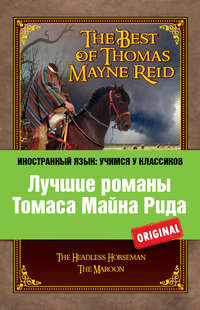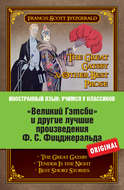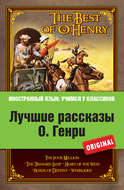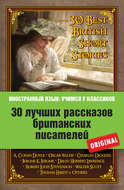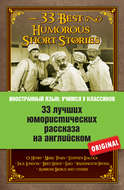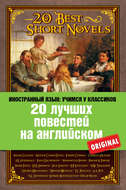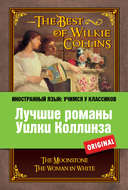Buch lesen: "Лучшие романы Томаса Майна Рида / The Best of Thomas Mayne Reid"
The Headless Horseman
Prologue
The stag of Texas1, reclining in midnight lair, is startled from his slumbers by the hoofstroke of a horse.
He does not forsake his covert, nor yet rise to his feet. His domain is shared by the wild steeds of the savannah2, given to nocturnal straying. He only uprears his head; and, with antlers o’ertopping the tall grass, listens for a repetition of the sound.
Again is the hoofstroke heard, but with altered intonation. There is a ring of metal – the clinking of steel against stone.
The sound, significant to the ear of the stag, causes a quick change in his air and attitude. Springing clear of his couch, and bounding a score of yards across the prairie3, he pauses to look back upon the disturber of his dreams.
In the clear moonlight of a southern sky, he recognises the most ruthless of his enemies – man. One is approaching upon horseback.
Yielding to instinctive dread, he is about to resume his flight: when something in the appearance of the horseman – some unnatural seeming – holds him transfixed to the spot.
With haunches in quivering contact with the sward, and frontlet faced to the rear, he continues to gaze – his large brown eyes straining upon the intruder in a mingled expression of fear and bewilderment.
What has challenged the stag to such protracted scrutiny?
The horse is perfect in all its parts – a splendid steed, saddled, bridled, and otherwise completely caparisoned. In it there appears nothing amiss – nothing to produce either wonder or alarm. But the man – the rider? Ah! About him there is something to cause both – something weird – something wanting!
By heavens! it is the head!
Even the unreasoning animal can perceive this; and, after gazing a moment with wildered eyes – wondering what abnormal monster thus mocks its cervine intelligence – terror-stricken it continues its retreat; nor again pauses, till it has plunged through the waters of the Leona4, and placed the current of the stream between itself and the ghastly intruder.
Heedless of the affrighted deer – either of its presence, or precipitate flight – the Headless Horseman rides on.
He, too, is going in the direction of the river. Unlike the stag, he does not seem pressed for time; but advances in a slow, tranquil pace: so silent as to seem ceremonious.
Apparently absorbed in solemn thought, he gives free rein to his steed: permitting the animal, at intervals, to snatch a mouthful of the herbage growing by the way. Nor does he, by voice or gesture, urge it impatiently onward, when the howl-bark of the prairie-wolf causes it to fling its head on high, and stand snorting in its tracks.
He appears to be under the influence of some all-absorbing emotion, from which no common incident can awake him. There is no speech – not a whisper – to betray its nature. The startled stag, his own horse, the wolf, and the midnight moon, are the sole witnesses of his silent abstraction.
His shoulders shrouded under a serape5, one edge of which, flirted up by the wind, displays a portion of his figure: his limbs encased in “water-guards” of jaguar-skin: thus sufficiently sheltered against the dews of the night, or the showers of a tropical sky, he rides on – silent as the stars shining above, unconcerned as the cicada6 that chirrups in the grass beneath, or the prairie breeze playing with the drapery of his dress.
Something at length appears to rouse from his reverie, and stimulate him to greater speed – his steed, at the same time. The latter, tossing up its head, gives utterance to a joyous neigh; and, with outstretched neck, and spread nostrils, advances in a gait gradually increasing to a canter. The proximity of the river explains the altered pace.
The horse halts not again, till the crystal current is surging against his flanks, and the legs of his rider are submerged knee-deep under the surface.
The animal eagerly assuages its thirst; crosses to the opposite side; and, with vigorous stride, ascends the sloping bank.
Upon the crest occurs a pause: as if the rider tarried till his steed should shake the water from its flanks. There is a rattling of saddle-flaps, and stirrup-leathers, resembling thunder, amidst a cloud of vapour, white as the spray of a cataract.
Out of this self-constituted nimbus7, the Headless Horseman emerges; and moves onward, as before.
Apparently pricked by the spur, and guided by the rein, of his rider, the horse no longer strays from the track; but steps briskly forward, as if upon a path already trodden.
A treeless savannah stretches before – selvedged by the sky. Outlined against the azure8 is seen the imperfect centaurean9 shape gradually dissolving in the distance, till it becomes lost to view, under the mystic gloaming of the moonlight!
Chapter 1
The Burnt Prairie
On the great plain of Texas, about a hundred miles southward from the old Spanish town of San Antonio de Bejar10, the noonday sun is shedding his beams from a sky of cerulean brightness. Under the golden light appears a group of objects, but little in unison with the landscape around them: since they betoken the presence of human beings, in a spot where there is no sign of human habitation.
The objects in question are easily identified – even at a great distance. They are waggons; each covered with its ribbed and rounded tilt of snow-white “Osnaburgh11.”
There are ten of them – scarce enough to constitute a “caravan” of traders, nor yet a “government train.” They are more likely the individual property of an emigrant; who has landed upon the coast, and is wending his way to one of the late-formed settlements on the Leona.
Slowly crawling across the savannah, it could scarce be told that they are in motion; but for their relative-position, in long serried line, indicating the order of march.
The dark bodies between each two declare that the teams are attached; and that they are making progress is proved, by the retreating antelope, scared from its noonday siesta, and the long-shanked curlew, rising with a screech from the sward – both bird and beast wondering at the string of strange behemoths, thus invading their wilderness domain.
Elsewhere upon the prairie, no movement may be detected – either of bird or quadruped. It is the time of day when all tropical life becomes torpid, or seeks repose in the shade; man alone, stimulated by the love of gain, or the promptings of ambition, disregarding the laws of nature, and defying the fervour of the sun.
So seems it with the owner of the tilted train; who, despite the relaxing influence of the fierce mid-day heat, keeps moving on.
That he is an emigrant – and not one of the ordinary class – is evidenced in a variety of ways. The ten large waggons of Pittsburgh12 build, each hauled by eight able-bodied mules; their miscellaneous contents: plenteous provisions, articles of costly furniture, even of luxe, live stock in the shape of coloured women and children; the groups of black and yellow bondsmen, walking alongside, or straggling foot-sore in the rear; the light travelling carriage in the lead, drawn by a span of sleek-coated Kentucky13 mules, and driven by a black Jehu14, sweltering in a suit of livery; all bespeak, not a poor Northern-States settler in search of a new home, but a rich Southerner who has already purchased one, and is on his way to take possession of it.
And this is the exact story of the train. It is the property of a planter who has landed at Indianola15, on the Gulf of Matagorda16; and is now travelling overland – en route17 for his destination.
In the cortège18 that accompanies it, riding habitually at its head, is the planter himself – Woodley Poindexter – a tall thin man of fifty, with a slightly sallowish complexion, and aspect proudly severe. He is simply though not inexpensively clad: in a loosely fitting frock of alpaca cloth, a waistcoat of black satin, and trousers of nankin19. A shirt of finest linen shows its plaits through the opening of his vest – its collar embraced by a piece of black ribbon; while the shoe, resting in his stirrup, is of finest tanned leather. His features are shaded by a broad-brimmed Leghorn hat20.
Two horsemen are riding alongside – one on his right, the other on the left – a stripling scarce twenty, and a young man six or seven years older. The former is his son – a youth, whose open cheerful countenance contrasts, not only with the severe aspect of his father, but with the somewhat sinister features on the other side, and which belong to his cousin.
The youth is dressed in a French blouse of sky-coloured “cottonade,” with trousers of the same material; a most appropriate costume for a southern climate, and which, with the Panama hat21 upon his head, is equally becoming.
The cousin, an ex-officer of volunteers, affects a military undress of dark blue cloth, with a forage cap to correspond.
There is another horseman riding near, who, only on account of having a white skin – not white for all that – is entitled to description. His coarser features, and cheaper habiliments; the keel-coloured “cowhide” clutched in his right hand, and flirted with such evident skill, proclaim him the overseer – and whipper up – of the swarthy pedestrians composing the entourage22 of the train.
The travelling carriage, which is a “carriole23” – a sort of cross between a Jersey waggon24 and a barouche25 – has two occupants. One is a young lady of the whitest skin; the other a girl of the blackest. The former is the daughter of Woodley Poindexter – his only daughter. She of the sable complexion is the young lady’s handmaid.
The emigrating party is from the “coast” of the Mississippi26 – from Louisiana27. The planter is not himself a native of this State – in other words a Creole28; but the type is exhibited in the countenance of his son – still more in that fair face, seen occasionally through the curtains of the carriole, and whose delicate features declare descent from one of those endorsed damsels – filles à la casette – who, more than a hundred years ago, came across the Atlantic provided with proofs of their virtue – in the casket!
A grand sugar planter of the South is Woodley Poindexter; one of the highest and haughtiest of his class; one of the most profuse in aristocratic hospitalities: hence the necessity of forsaking his Mississippian home, and transferring himself and his “penates29,” – with only a remnant of his “niggers,” – to the wilds of south-western Texas.
The sun is upon the meridian line, and almost in the zenith. The travellers tread upon their own shadows. Enervated by the excessive heat, the white horsemen sit silently in their saddles. Even the dusky pedestrians, less sensible to its influence, have ceased their garrulous “gumbo;” and, in straggling groups, shamble listlessly along in the rear of the waggons.
The silence – solemn as that of a funereal procession – is interrupted only at intervals by the pistol-like crack of a whip, or the loud “wo-ha,” delivered in deep baritone from the thick lips of some sable teamster.
Slowly the train moves on, as if groping its way. There is no regular road. The route is indicated by the wheel-marks of some vehicles that have passed before – barely conspicuous, by having crushed the culms of the shot grass.
Notwithstanding the slow progress, the teams are doing their best. The planter believes himself within less than twenty miles of the end of his journey. He hopes to reach it before night: hence the march continued through the mid-day heat.
Unexpectedly the drivers are directed to pull up, by a sign from the overseer; who has been riding a hundred yards in the advance, and who is seen to make a sudden stop – as if some obstruction had presented itself.
He comes trotting back towards the train. His gestures tell of something amiss. What is it?
There has been much talk about Indians – of a probability of their being encountered in this quarter.
Can it be the red-skinned marauders? Scarcely: the gestures of the overseer do not betray actual alarm.
“What is it, Mr Sansom?” asked the planter, as the man rode up.
“The grass air burnt. The prairy’s been afire.”
“Been on fire! Is it on fire now?” hurriedly inquired the owner of the waggons, with an apprehensive glance towards the travelling carriage. “Where? I see no smoke!”
“No, sir – no,” stammered the overseer, becoming conscious that he had caused unnecessary alarm; “I didn’t say it air afire now: only thet it hez been, an the hul ground air as black as the ten o’ spades.”
“Ta – tat! what of that? I suppose we can travel over a black prairie, as safely as a green one?
“What nonsense of you, Josh Sansom, to raise such a row about nothing – frightening people out of their senses! Ho! there, you niggers! Lay the leather to your teams, and let the train proceed. Whip up! – whip up!”
“But, Captain Calhoun,” protested the overseer, in response to the gentleman who had reproached him in such chaste terms; “how air we to find the way?”
“Find the way! What are you raving about? We haven’t lost it – have we?”
“I’m afeerd we hev, though. The wheel-tracks ain’t no longer to be seen. They’re burnt out, along wi’ the grass.”
“What matters that? I reckon we can cross a piece of scorched prairie, without wheel-marks to guide us? We’ll find them again on the other side.”
“Ye-es,” naïvely responded the overseer, who, although a “down-easter,” had been far enough west to have learnt something of frontier life; “if theer air any other side. I kedn’t see it out o’ the seddle – ne’er a sign o’ it.”
“Whip up, niggers! whip up!” shouted Calhoun, without heeding the remark; and spurring onwards, as a sign that the order was to be obeyed.
The teams are again set in motion; and, after advancing to the edge of the burnt tract, without instructions from any one, are once more brought to a stand.
The white men on horseback draw together for a consultation. There is need: as all are satisfied by a single glance directed to the ground before them.
Far as the eye can reach the country is of one uniform colour – black as Erebus30. There is nothing green – not a blade of grass – not a reed nor weed!
It is after the summer solstice. The ripened culms of the gramineae31, and the stalks of the prairie flowers, have alike crumbled into dust under the devastating breath of fire.
In front – on the right and left – to the utmost verge of vision extends the scene of desolation. Over it the cerulean sky is changed to a darker blue; the sun, though clear of clouds, seems to scowl rather than shine – as if reciprocating the frown of the earth.
The overseer has made a correct report – there is no trail visible. The action of the fire, as it raged among the ripe grass, has eliminated the impression of the wheels hitherto indicating the route. “What are we to do?”
The planter himself put this inquiry, in a tone that told of a vacillating spirit.
“Do, uncle Woodley! What else but keep straight on? The river must be on the other side? If we don’t hit the crossing, to a half mile or so, we can go up, or down the bank – as the case may require.”
“But, Cassius: if we should lose our way?”
“We can’t. There’s but a patch of this, I suppose? If we do go a little astray, we must come out somewhere – on one side, or the other.”
“Well, nephew, you know best: I shall be guided by you.”
“No fear, uncle. I’ve made my way out of a worse fix than this. Drive on, niggers! Keep straight after me.”
The ex-officer of volunteers, casting a conceited glance towards the travelling carriage – through the curtains of which appears a fair face, slightly shadowed with anxiety – gives the spur to his horse; and with confident air trots onward.
A chorus of whipcracks is succeeded by the trampling of fourscore mules, mingled with the clanking of wheels against their hubs. The waggon-train is once more in motion.
The mules step out with greater rapidity. The sable surface, strange to their eyes, excites them to brisker action – causing them to raise the hoof, as soon as it touches the turf. The younger animals show fear – snorting, as they advance.
In time their apprehensions become allayed; and, taking the cue from their older associates, they move on steadily as before.
A mile or more is made, apparently in a direct line from the point of starting. Then there is a halt. The self-appointed guide has ordered it. He has reined up his horse; and is sitting in the saddle with less show of confidence. He appears to be puzzled about the direction.
The landscape – if such it may be called – has assumed a change; though not for the better. It is still sable as ever, to the verge of the horizon. But the surface is no longer a plain: it rolls. There are ridges – gentle undulations – with valleys between. They are not entirely treeless – though nothing that may be termed a tree is in sight. There have been such, before the fire – algarobias32, mezquites33, and others of the acacia family – standing solitary, or in copses. Their light pinnate foliage has disappeared like flax before the flame. Their existence is only evidenced by charred trunks, and blackened boughs.
“You’ve lost the way, nephew?” said the planter, riding rapidly up.
“No uncle – not yet. I’ve only stopped to have a look. It must lie in this direction – down that valley. Let them drive on. We’re going all right – I’ll answer for it.”
Once more in motion – adown the slope – then along the valley – then up the acclivity of another ridge – and then there is a second stoppage upon its crest.
“You’ve lost the way, Cash?” said the planter, coming up and repeating his former observation.
“Damned if I don’t believe I have, uncle!” responded the nephew, in a tone of not very respectful mistrust. “Anyhow; who the devil could find his way out of an ashpit like this? No, no!” he continued, reluctant to betray his embarrassment as the carriole came up. “I see now. We’re all right yet. The river must be in this direction. Come on!”
On goes the guide, evidently irresolute. On follow the sable teamsters, who, despite their stolidity, do not fail to note some signs of vacillation. They can tell that they are no longer advancing in a direct line; but circuitously among the copses, and across the glades that stretch between.
All are gratified by a shout from the conductor, announcing recovered confidence. In response there is a universal explosion of whipcord, with joyous exclamations.
Once more they are stretching their teams along a travelled road – where a half-score of wheeled vehicles must have passed before them. And not long before: the wheel-tracks are of recent impress – the hoof-prints of the animals fresh as if made within the hour. A train of waggons, not unlike their own, must have passed over the burnt prairie!
Like themselves, it could only be going towards the Leona: perhaps some government convoy on its way to Fort Inge34? In that case they have only to keep in the same track. The Fort is on the line of their march – but a short distance beyond the point where their journey is to terminate.
Nothing could be more opportune. The guide, hitherto perplexed – though without acknowledging it – is at once relieved of all anxiety; and with a fresh exhibition of conceit, orders the route to be resumed.
For a mile or more the waggon-tracks are followed – not in a direct line, but bending about among the skeleton copses. The countenance of Cassius Calhoun, for a while wearing a confident look, gradually becomes clouded. It assumes the profoundest expression of despondency, on discovering that the four-and-forty wheel-tracks he is following, have been made by ten Pittsburgh waggons, and a carriole – the same that are now following him, and in whose company he has been travelling all the way from the Gulf of Matagorda!
Chapter 2
The Trail of the Lazo
Beyond doubt, the waggons of Woodley Poindexter were going over ground already traced by the tiring of their wheels.
“Our own tracks!” muttered Calhoun on making the discovery, adding a fierce oath as he reined up.
“Our own tracks! What mean you, Cassius? You don’t say we’ve been travelling – ”
“On our own tracks. I do, uncle; that very thing. We must have made a complete circumbendibus of it. See! here’s the hind hoof of my own horse, with half a shoe off; and there’s the foot of the niggers. Besides, I can tell the ground. That’s the very hill we went down as we left our last stopping place. Hang the crooked luck! We’ve made a couple of miles for nothing.”
Embarrassment is no longer the only expression upon the face of the speaker. It has deepened to chagrin, with an admixture of shame. It is through him that the train is without a regular guide. One, engaged at Indianola, had piloted them to their last camping place. There, in consequence of some dispute, due to the surly temper of the ex-captain of volunteers, the man had demanded his dismissal, and gone back.
For this – as also for an ill-timed display of confidence in his power to conduct the march – is the planter’s nephew now suffering under a sense of shame. He feels it keenly as the carriole comes up, and bright eyes become witnesses of his discomfiture.
Poindexter does not repeat his inquiry. That the road is lost is a fact evident to all. Even the barefooted or “broganned” pedestrians have recognised their long-heeled footprints, and become aware that they are for the second time treading upon the same ground.
There is a general halt, succeeded by an animated conversation among the white men. The situation is serious: the planter himself believes it to be so. He cannot that day reach the end of his journey – a thing upon which he had set his mind.
That is the very least misfortune that can befall them. There are others possible, and probable. There are perils upon the burnt plain. They may be compelled to spend the night upon it, with no water for their animals. Perhaps a second day and night – or longer – who can tell how long?
How are they to find their way? The sun is beginning to descend; though still too high in heaven to indicate his line of declination. By waiting a while they may discover the quarters of the compass.
But to what purpose? The knowledge of east, west, north, and south can avail nothing now: they have lost their line of march.
Calhoun has become cautious. He no longer volunteers to point out the path. He hesitates to repeat his pioneering experiments – after such manifest and shameful failure.
A ten minutes’ discussion terminates in nothing. No one can suggest a feasible plan of proceeding. No one knows how to escape from the embrace of that dark desert, which appears to cloud not only the sun and sky, but the countenances of all who enter within its limits.
A flock of black vultures is seen flying afar off. They come nearer, and nearer. Some alight upon the ground – others hover above the heads of the strayed travellers. Is there a boding in the behaviour of the birds?
Another ten minutes is spent in the midst of moral and physical gloom. Then, as if by a benignant mandate from heaven, does cheerfulness re-assume its sway. The cause? A horseman riding in the direction of the train!
An unexpected sight: who could have looked for human being in such a place? All eyes simultaneously sparkle with joy; as if, in the approach of the horseman, they beheld the advent of a saviour!
“He’s coming this way, is he not?” inquired the planter, scarce confident in his failing sight.
“Yes, father; straight as he can ride,” replied Henry, lifting the hat from his head, and waving it on high: the action accompanied by a shout intended to attract the horseman.
The signal was superfluous. The stranger had already sighted the halted waggons; and, riding towards them at a gallop, was soon within speaking distance.
He did not draw bridle, until he had passed the train; and arrived upon the spot occupied by the planter and his party.
“A Mexican!” whispered Henry, drawing his deduction from the habiliments of the horseman.
“So much the better,” replied Poindexter, in the same tone of voice; “he’ll be all the more likely to know the road.”
“Not a bit of Mexican about him,” muttered Calhoun, “excepting the rig. I’ll soon see. Buenos días, cavallero! Está V. Mexicano?” (Good day, sir! are you a Mexican?)
“No, indeed,” replied the stranger, with a protesting smile. “Anything but that. I can speak to you in Spanish, if you prefer it; but I dare say you will understand me better in English: which, I presume, is your native tongue?”
Calhoun, suspecting that he had spoken indifferent Spanish, or indifferently pronounced it, refrains from making rejoinder.
“American, sir,” replied Poindexter, his national pride feeling slightly piqued. Then, as if fearing to offend the man from whom he intended asking a favour, he added: “Yes, sir; we are all Americans – from the Southern States.”
“That I can perceive by your following.” An expression of contempt – scarce perceptible – showed itself upon the countenance of the speaker, as his eye rested upon the groups of black bondsmen. “I can perceive, too,” he added, “that you are strangers to prairie travelling. You have lost your way?”
“We have, sir; and have very little prospect of recovering it, unless we may count upon your kindness to direct us.”
“Not much kindness in that. By the merest chance I came upon your trail, as I was crossing the prairie. I saw you were going astray; and have ridden this way to set you right.”
“It is very good of you. We shall be most thankful, sir. My name is Poindexter – Woodley Poindexter, of Louisiana. I have purchased a property on the Leona river, near Fort Inge. We were in hopes of reaching it before nightfall. Can we do so?”
“There is nothing to hinder you: if you follow the instructions I shall give.”
On saying this, the stranger rode a few paces apart; and appeared to scrutinise the country – as if to determine the direction which the travellers should take.
Poised conspicuously upon the crest of the ridge, horse and man presented a picture worthy of skilful delineation.
A steed, such as might have been ridden by an Arab sheik – blood-bay in colour – broad in counter – with limbs clean as culms of cane, and hips of elliptical outline, continued into a magnificent tail sweeping rearward like a rainbow: on his back a rider – a young man of not more than five-and-twenty – of noble form and features; habited in the picturesque costume of a Mexican ranchero36 – spencer jacket of velveteen – calzoneros37 laced along the seams – calzoncillos38 of snow-white lawn – botas39 of buff leather, heavily spurred at the heels – around the waist a scarf of scarlet crape; and on his head a hat of black glaze, banded with gold bullion. Picture to yourself a horseman thus habited; seated in a deep tree-saddle, of Moorish40 shape and Mexican manufacture, with housings of leather stamped in antique patterns, such as were worn by the caparisoned steeds of the Conquistadores41; picture to yourself such a cavallero42, and you will have before your mind’s eye a counterpart of him, upon whom the planter and his people were gazing.
Through the curtains of the travelling carriage he was regarded with glances that spoke of a singular sentiment. For the first time in her life, Louise Poindexter looked upon that – hitherto known only to her imagination – a man of heroic mould. Proud might he have been, could he have guessed the interest which his presence was exciting in the breast of the young Creole.
He could not, and did not. He was not even aware of her existence. He had only glanced at the dust-bedaubed vehicle in passing – as one might look upon the rude incrustation of an oyster, without suspecting that a precious pearl may lie gleaming inside.
“By my faith!” he declared, facing round to the owner of the waggons, “I can discover no landmarks for you to steer by. For all that, I can find the way myself. You will have to cross the Leona five miles below the Fort; and, as I have to go by the crossing myself, you can follow the tracks of my horse. Good day, gentlemen!”
Thus abruptly bidding adieu, he pressed the spur against the side of his steed; and started off at a gallop.
An unexpected – almost uncourteous departure! So thought the planter and his people.
They had no time to make observations upon it, before the stranger was seen returning towards them!
In ten seconds he was again in their presence – all listening to learn what had brought him back.
“I fear the tracks of my horse may prove of little service to you. The mustangs43 have been this way, since the fire. They have made hoof-marks by the thousand. Mine are shod; but, as you are not accustomed to trailing, you may not be able to distinguish them – the more so, that in these dry ashes all horse-tracks are so nearly alike.”
“What are we to do?” despairingly asked the planter.
“I am sorry, Mr Poindexter, I cannot stay to conduct you, I am riding express, with a despatch for the Fort. If you should lose my trail, keep the sun on your right shoulders: so that your shadows may fall to the left, at an angle of about fifteen degrees to your line of march. Go straight forward for about five miles. You will then come in sight of the top of a tall tree – a cypress. You will know it by its leaves being in the red. Head direct for this tree. It stands on the bank of the river; and close by is the crossing.”
The young horseman, once more drawing up his reins, was about to ride off; when something caused him to linger. It was a pair of dark lustrous eyes – observed by him for the first time – glancing through the curtains of the travelling carriage.
Their owner was in shadow; but there was light enough to show that they were set in a countenance of surpassing loveliness. He perceived, moreover, that they were turned upon himself – fixed, as he fancied, in an expression that betokened interest – almost tenderness!
He returned it with an involuntary glance of admiration, which he made but an awkward attempt to conceal. Lest it might be mistaken for rudeness, he suddenly faced round; and once more addressed himself to the planter – who had just finished thanking him for his civility.
